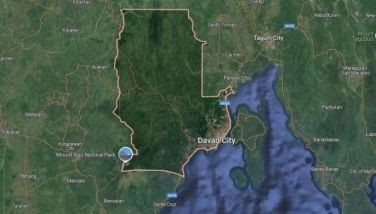Step in the wrong direction
Arbitration is a procedure in which a dispute is submitted, by agreement of the parties, to one or more arbitrators who make a binding decision on the dispute. In choosing arbitration, the parties opt for a private dispute resolution procedure instead of going to court.(www.wipo.int)
Arbitration, as an alternative means of dispute resolution, has long been accepted and recognized in the Philippine. It is the substitution by consent of the parties of another tribunal for the tribunals provided by the ordinary processes of law. Its object is the final disposition, in a speedy and inexpensive way, of the matters involved, so that they may not become the subject of future litigation between the parties. (Victor Lazatin and Patricia Ann Prodigalidad, Arbitration in the Philippines)
To put it plainly, arbitration is consensual. The parties who enter into a contract or agreement decide at the onset that any dispute that may arise out of such contract or agreement shall be settled by arbitration. And the decision of the arbitral tribunal or panel is final and is supposed to be easy to enforce.
But our government, or in particular some of its agencies, seems to have no sense of what arbitration is, despite the fact that our country has chosen to promote alternative methods of dispute resolution to unclog our courts and provide for a more expeditious and non-litigious means of putting an end of disputes.
Take the case of the Metropolitan Waterworks and Sewerage System (MWSS) and its Regulatory Office (RO), which has signified its decision to defy the ruling of the Appeals Panel in Singapore of the International Chamber of Commerce (ICC) affirming the rate adjustment of the Maynilad Water Services Inc. (MWSI), in keeping with a mandatory proviso in its 1997 concession agreement with MWSS on adjusting tariffs once every five years.
(The other one of course is the Bases Conversion and Development Authority which is questioning the decision by the arbitral panel ordering BCDA to return to the Sobrepena group more than a billion pesos in rental involving the Camp John Hay property)
This five-year rate rebasing system, which can also be found in MWSS’contract with Manila Water Co. (MWC), was tucked in the 1997 privatization package to attract investors and assure them of a mechanism to recoup their would-be multibillion-peso investments. This happened almost two decades ago when the national government was stuck with a heavily-indebted and bungling MWSS and was in desperate need of private concessionaires to take over water service delivery across Metro Manila ahead of a then-looming water crisis.
But low and behold, MWSS refused to allow the two concessionaires to implement a rate rebasing.
Both Maynilad and MWC filed separate arbitration cases before the ICC, the forum that is supposed to govern disputes between government and its two concessionaires as provided in their 1997 contracts, over MWSS’unwarranted policy reversal and contract breach.
Late last year, the Appeals Panel decided in favor of Maynilad and is due to render its ruling n MWC’s separate complaint sometime this year.
At the onset, it looked like Maynilad’s new tariff structure was already a go because the decision became final and executory especially after MWSS did not avail of the 30-day period, stated in the 1997 deal, to appeal or seek clarification of the Dec. 29 arbitral order.
But from out of the blue, MWSS administrator Gerard Esquivel and MWSS chief regulator Joel Yu said separately that although their agency would no longer appeal the Dec. 29 ruling, they would defer action on it until after the ICC has decided on MWC’s case to avoid any inconsistencies.
Now this is confusing. As pointed out by Maynilad chief finance officer Randy Estrellado, what will that mean if the other concessionaire loses its case? The two cases are independent of each other so what inconsistency is MWSS talking about?
Given that the arbitral decision is supposed to be final and executory, Estrellado said MWSS was supposed to have no choice but to approve the new water rates. But without the MWSS Board approval, Maynilad cannot publish them before implementation.
Low-income Metro folk are the real winners in this ICC decision because the MWSS-ordered arbitrary rate cut in 2013 would have undermined Maynilad’s cash-intensive, long-term modernization program to supply potable water to as many households as possible in its West Zone concession.
The rate adjustment as affirmed by the ICC is actually modest because Maynilad itself reduced its rate hike in the alternative business proposal that it had submitted to the Appeals Panel in the course of the arbitration proceedings.
Maynilad has also proposed to MWSS to collect the rate adjustment on a staggered basis over the next three years, equivalent each year to less than a peso per cubic meter, even if the rate-rebasing process component of its 1997 concession agreement with government allows it collect new rates on a one-time basis.
If MWSS continues to refuse to implement the ICC award, what Maynilad can actually do is ask the courts to step in and issue something similar to a writ of execution to compel the other party to comply with the arbitral award.
Maynilad is raising its capex budget for reducing non-revenue water (NRW) by a sizable 25 percent to P3.2 billion this year from P2.2 billion in 2014. Of this amount, P2.1 billion would go to selective pipe replacement in Caloocan, Manila, Parañaque, and Cavite.
Another P680 million will be spent on meter management, which aims to improve billing accuracy and reduce meter malfunctions that contribute to commercial losses, arising from theft and metering inaccuracies.
It is setting aside P400 million for the establishment and maintenance of District Metered Areas (DMA) for more effective monitoring and management of water supply and pressure, as well as easier identification of leaks through diagnostics, assessment, and leak repair.
The rest of the capex budget will be used for leak detection equipment and technical services.
According to Maynilad president Ricky Vargas, in 2014, they have successfully reduced water losses to 33 percent from 35 percent in 2013 and that their increased investment in their non-revenue water management program aims to recover more water that can be reallocated for the use of the customers.
For comments, observations, and suggestions, e-mail at maryannreyesphilstar@gmail.com
- Latest
- Trending





























